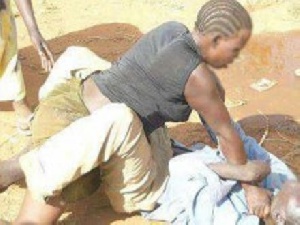518 Men (husbands) in the Northern Region were reportedly beaten by their wives or subjected to various forms of abuses ending at the police station for redress.
According to latest statistics released by the Domestic Violence and Victim Support Unit (DOVVSU) of the Ghana Police Service in Tamale, there is an increase in the number of men now coming out boldly to report their abusive wives to the unit in the Northern Region.
In 2009, 71 cases were reported by the men, 47 in 2010, 44 in 2011, 77 in 2012, 147 in 2013 and 132 in 2014.
Even though the figure is still far below what the women also reported within the same period, the Northern Regional Coordinator of DOVVSU, ASP Emmanuel Holortu, said that the level of confidence exhibited by the men portrayed the understanding and acceptability of the Domestic Violent campaign in the region.
At a capacity building workshop for District and Divisional Police Commanders and DOVVSU desk officers on the effective implementation of the Domestic Violence Policy, Mr. Holortu bemoaned that women in the Northern Region continue to be at the receiving end of the worst forms of the abuses, which hinder their fundamental human rights and socio-economic advancement.
The Workshop was sponsored by the United Nations Population Fund (UNFPA).
Statistics released at the workshop indicated that as high as 2,391 domestic violence cases were recorded in the Northern Region, between 2009 and 2014, by the DOVVSU.
Major cases of abuse reported to the DOVVSU included rape, defilement, indecent assault, threat of unlawful harm or death, causing unlawful harm or damage, assault, compulsion of marriage, non-maintenance of spouse and children among others.
Out of the figure, 1,937 women were victims of domestic violence, as against 518 men in the years under review.
In 2014 alone, the Northern Region recorded 667 cases of domestic violence, representing 544 females and 132 males.
The Regional DOVVSU Coordinator noted that the high number of cases reported over the years suggested that most of the victims of domestic violence were now appreciating the fact that they had their rights, freedom and protection under the Constitution.
He indicated that as high as 84% of women in the Northern Region accept domestic violence as a social or cultural norm (Multi Indicator Cluster Survey 2011), and as a result, most of the cultural and traditional practices and norms were found to be at variance with the existing laws of the land.
Mr. Holortu noted that domestic violence occurs when a person connected to another in a relationship defined by law to be a domestic relationship, treats the other in an intentionally violent or controlling manner.
The Northern Regional Police Commander, DCOP Ken Yeboah, regretted that the number of abuses recorded between 2009 and 2014 were less than 20 percent of the true cases of domestic violence that occurred in the various communities in the region.
He complained that domestic violence victims in the rural areas were mostly prevented by their traditional rulers and opinion leaders from reporting such cases to the law enforcement agencies.
DCOP Yeboah, who had on several platforms and on a one-on-one basis cautioned some of the traditional rulers to desist from always trying to handle criminal cases in their palaces, also encouraged the victims to report to the police for the necessary legal action.
DCOP Ken Yeboah revealed that some of the women failed to report their abusive husbands due to the fear of losing their marriage.
He also encouraged his personnel to enforce the existing laws to change all the harmful practices and conducts, which were dehumanising and serve as impediments to social progress.
The Deputy Northern Regional Minister, Alhaji A.B.A Fuseini, on behalf of the Northern Regional Minister, urged district police commanders and station officers to assist in curbing the incidence of sexual and gender-based violence in the region.
Alhaji A.B.A Fuseini said the training of the district commanders and station officers was to increase their knowledge and skills base to fight sexual and gender-based violence, and also to equip the officers to monitor officers in charge of such issues to ensure sustainability.
The Minister revealed that a Regional Technical Team (RTT), comprising institutions such as the Ghana Health Service, DOVVSU, Department of Gender, the National Youth Authority (NYA) and the Regional Coordinating Council (RCC), had been established to reduce poverty and to ensure that every pregnancy was wanted, every birth was safe, every young person was free of HIV/AIDS, and every girl or woman treated with dignity and respect.
A similar workshop was organised in 2014 for DOVVSU desk officers and investigators in the region, which has yielded very good results.
Reporting of domestic violence cases, which used to be a challenge in the region, is gradually becoming a thing of the past, he added.
In January 2015 alone, 75 cases of sexual and gender-based violence were reported to the DOVVSU in Tamale.
General News of Tuesday, 24 March 2015
Source: The Chronicle

















